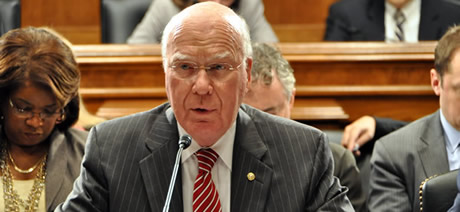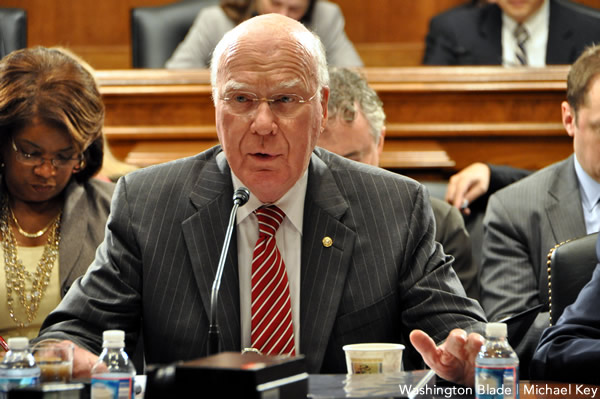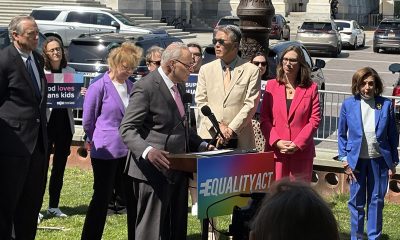News
Leahy withholds amendments for gay couples in immigration bill
In tearful speeches, Dems says time is wrong for measures


Sen. Patrick Leahy (D-Vt.) withheld UAFA as a committee amendment. (Blade file photo by Michael Key)
Senate Judiciary Committee Chair Patrick Leahy (D-Vt.) on Tuesday withheld amendments to include gay couples as part of immigration reform in the aftermath of speeches — sometimes tearful — from Democrats on the panel who said they couldn’t support the measures.
After an extended speech on why he believes discrimination against gay couples is wrong — Leahy said “with a heavy heart” he wouldn’t introduce the amendments before the Senate Judiciary Committee. They would have made bi-national same-sex couples equal under the law to straight couples for immigration purposes.
“In the immigration context, if you’re an American and fall in love will someone of the same sex from a different country and you get married legally, your spouse will not be treated like any other immigrant spouse would be by your federal government,” Leahy said. “My amendments would change that. I don’t want to be the senator who asks Americans to choose between the love of their life and the love of their country.”
During his remarks, Leahy asked members of the “Gang of Eight” who produced the base bill and were also members of the Senate Judiciary Committee why they decided to exclude gay couples from the initial legislation.
Under current law, gay Americans are unable to sponsor their foreign partners for residency in the United States — even if they’re married — unlike straight Americans. For couples that are married, that’s because of the Defense of Marriage Act, which prohibits federal recognition of same-sex marriage. LGBT advocates had been pushing Congress to rectify this issue as part of comprehensive immigration reform.
Two amendments were proposed by Leahy. One mirrored the Uniting American Families Act, which would enable gay Americans to sponsor their foreign partners for residency in the United States. The other would have allowed for the approval of marriage-based green card applications for married same-sex couples.
Democrats who are known for being LGBT rights supporters — Sens. Chuck Schumer (D-N.Y.), Al Franken (D-Minn.), Dianne Feinstein (D-Calif.) and Richard Durbin (D-Ill.) — said they were torn on the issue, but couldn’t support the amendments out of fear they would lose Republican support and it would kill the legislative package.
Feinstein said the Supreme Court, which is currently considering the constitutionality of DOMA, may make the issue “moot” because a ruling against the anti-gay law in June would end federal discrimination against married same-sex couples.
“We now know that this is going to blow the agreement apart,” Feinstein said. “I don’t want to lose Sen. Graham’s vote because Sen. Graham’s vote can represent and be used as the rationale for dozens of other [lawmakers] who then will not vote for the immigration bill. … I am for what Sen. Leahy is proposing, I would just implore to hold off on this amendment at this time.”
Schumer, a member of the “Gang of Eight,” said he tried to persuade other senators to support the idea and believes current law is “rank discrimination,” but can’t bring himself to support the amendments because of Republican opposition.
“If we make the effort to add it to this bill, they will walk away,” Schumer said. “They’ve said it publicly, they’ve told me privately — I believe them. The result: no equality, no immigration bill. Everyone loses.”
Prior to the vote, Schumer was targeted by LGBT groups for being the only Democrat on the committee to not voice support for including UAFA as part of the larger package.
Durbin was particularly emotional and had tears in his eyes as he explained why they couldn’t support the measures. A member of the “Gang of Eight,” Durbin said he supports UAFA, but doesn’t see immigration reform as the best vehicle for the measure.
“I believe in my heart of hearts that what you’re doing is the right and just thing … but I believe this is the wrong moment, this is the wrong bill,” Durbin said. “There are approximately 250,000 LGBT undocumented immigrants in America that would benefit from passage of immigration reform. I want to make certain they have that chance.”
LGBT rights groups responded to the committee’s exclusion of same-sex couples from immigration reform with vocal disappointment.
Rachel Tiven, executive director of the LGBT group Immigration Equality, attended the markup and — while she said she’s “proud’ of Leahy for his support — expressed frustration with other Democrats.
“I’m very proud of Sen. Leahy; I’m very dismayed that his colleagues did not stand up with him to talk about the dignity of LGBT immigrant families,” Tiven said. “Only Sen. Leahy talked about the LGBT immigrants that he represents who have dreams, too, and who want to see a good bill passed that will help everyone, and who need immigration reform as badly as any other immigrant.”
Tiven named Democrats on the panel with whom she was particularly disappointed because of their previously articulated support for the LGBT community.
“To hear Sen. Durbin say, ‘Well, this is an outside issue like gun control,’ to hear that Sen. Franken didn’t speak up for families like Ginger and Ness Madeiros, whose visa runs out in August — what are they and their eight-month-old son going to do?” Tiven said. “I can’t imagine how they’re feeling right now about Sen. Franken. How could he not say these are immigrant families, too?”
With the exception of Schumer, Tiven maintained the Democrats on the panel expressed support for including same-sex couples in the reform package, which made their statements during the committee markup surprising.
But Republican members of the panel were most opposed to including the measures. They reiterated their opposition to including the measure in the package and said adopting them would break apart the coalition that helped put it together.
Sen. Lindsey Graham (R-S.C.), a Republican member of the “Gang of Eight,” said the legislation would lose support from evangelical Christians and the Catholic Church, who’ve supported the measure, if those protections were included.
“I support traditional marriage without animosity,” Graham said. “I’m not married; I guess that means maybe I shouldn’t speak at all about it, but I do believe that the people of my state, and the people of other states who have gone different ways than Vermont, believe it would throw the coalition out of balance.”
When Leahy asked Graham if anything in the amendments would require South Carolina to change its state law on marriage, Graham said no, but maintained it would be making him vote in favor of a concept he opposes.
“You got me on immigration; you don’t got me on marriage,” Graham said. “I can’t just tell any more directly; you want to keep me on immigration; let’s stay on immigration.”
Sen. Jeff Flake (R-Ariz.), another GOP member of the “Gang of Eight,” also said he expected the coalition that put the bill together to fall apart if same-sex couples were included.
“This is an issue that is being addressed by the courts right now, I think that it would certainly upset the coalition that we have,” Flake said. “Certainly, we in Arizona, like in South Carolina, have spoken on the issue. It would certainly mean that this bill would not move forward. That would be a real shame, given how far we’ve come and the work that’s gone into this.”
Winnie Stachelberg, vice president of external affairs at the Center for American Progress, pointed at Republicans as the reason why same-sex couples weren’t included in the legislation.
“We’re all disappointed that at this juncture in the process, a small handful of Republicans prevented the provision from being voted on, but we’ve got a long way to go in the process and we’ll continue to work hard to secure the votes on the floor if it comes up,” Stachelberg said.
Following the discussion on the Leahy amendments, the committee reported out the legislation by a 13-5 vote. Supporters of immigration reform in the room — largely members of immigrant community — chanted, “Yes we can! Yes we can!” and embraced senators who voted in favor of the legislation as they snapped photos with them.
According to a report from the Williams Institute, an estimated 275,000 undocumented LGBT Americans would have a path to citizenship as the legislation currently stands if it reaches President Obama’s desk and is signed into law.
In a statement after the vote, Obama, who called for a gay-inclusive bill as part of his vision for reform, commended the committee for completing work on the legislation and urged a floor vote as soon as possible.
“None of the committee members got everything they wanted, and neither did I , but in the end, we all owe it to the American people to get the best possible result over the finish line,” Obama said. “I encourage the full Senate to bring this bipartisan bill to the floor at the earliest possible opportunity and remain hopeful that the amendment process will lead to further improvements.”
Leahy’s announcement came after an Associated Press report saying the White House had asked the Vermont senator to hold off on offering the amendments until the measure goes before the full Senate.
It’s unclear whether Leahy will introduce the amendments once the legislation reaches the Senate floor, which is expected early in June. Passage on the Senate floor would be significantly more difficult than passage would have been in committee if a 60-vote threshold is necessary to overcome a filibuster.
After the committee reported out the bill, the Washington Blade asked Sen. Chuck Schumer (D-N.Y.) whether he wants to see UAFA brought up as an amendment on the Senate floor.
“You’ll have to ask Sen. Leahy about that,” Schumer replied. “As you heard, I believe strongly in UAFA. I don’t think I have to say anything more; I spoke long enough on it.”
Although the amendment for same-sex couples wasn’t included, the committee on Monday rejected an amendment that would have removed a provision supported by LGBT advocates that was included in the base bill.
Sen. Charles Grassley (R-Iowa) offered two amendments that would have eliminated the repeal of the one-year filing deadline for asylum seekers. One amendment failed on a vote of 6-12 and the other failed on a vote of 9-9.
LGBT advocates had supported that provision in the base bill because LGBT asylum seekers often don’t know they have a one-year deadline to apply for asylum in the United States, or lack financial resources to make the application.
Maryland
LGBTQ suicide prevention hotline option is going away. Here’s where else to go in Md.
Changes will take effect July 17

By ANNA RUBENSTEIN | The national suicide prevention hotline will no longer offer specialized support to LGBTQ people, starting July 17, the Trump administration announced last week.
Dialing the hotline at 988 will still be available for crisis support. But callers will no longer be able to reach specific LGBTQ services by pressing Option 3. The change worries advocates because their data shows the LGBTQ community has a disproportionally high suicide rate.
Even after the option ends, here’s how to receive tailored support if you’re in Maryland.
The rest of this article can be found on the Baltimore Banner’s website.
New York
Two teens shot steps from Stonewall Inn after NYC Pride parade
One of the victims remains in critical condition

On Sunday night, following the annual NYC Pride March, two girls were shot in Sheridan Square, feet away from the historic Stonewall Inn.
According to an NYPD report, the two girls, aged 16 and 17, were shot around 10:15 p.m. as Pride festivities began to wind down. The 16-year-old was struck in the head and, according to police sources, is said to be in critical condition, while the 17-year-old was said to be in stable condition.
The Washington Blade confirmed with the NYPD the details from the police reports and learned no arrests had been made as of noon Monday.
The shooting took place in the Greenwich Village neighborhood of Manhattan, mere feet away from the most famous gay bar in the city — if not the world — the Stonewall Inn. Earlier that day, hundreds of thousands of people marched down Christopher Street to celebrate 55 years of LGBTQ people standing up for their rights.
In June 1969, after police raided the Stonewall Inn, members of the LGBTQ community pushed back, sparking what became known as the Stonewall riots. Over the course of two days, LGBTQ New Yorkers protested the discriminatory policing of queer spaces across the city and mobilized to speak out — and throw bottles if need be — at officers attempting to suppress their existence.
The following year, LGBTQ people returned to the Stonewall Inn and marched through the same streets where queer New Yorkers had been arrested, marking the first “Gay Pride March” in history and declaring that LGBTQ people were not going anywhere.
New York State Assemblywoman Deborah Glick, whose district includes Greenwich Village, took to social media to comment on the shooting.
“After decades of peaceful Pride celebrations — this year gun fire and two people shot near the Stonewall Inn is a reminder that gun violence is everywhere,” the lesbian lawmaker said on X. “Guns are a problem despite the NRA BS.”
India
Anaya Bangar challenges ban on trans women in female cricket teams
Former Indian cricketer Sanjay Bangar’s daughter has received support

Anaya Bangar, the daughter of former Indian cricketer Sanjay Bangar, has partnered with the Manchester Metropolitan University Institute of Sport in the U.K. to assess her physiological profile following her gender-affirming surgery and undergoing hormone replacement therapy.
From January to March 2025, the 23-year-old underwent an eight-week research project that measured her glucose levels, oxygen uptake, muscle mass, strength, and endurance after extensive training.
The results, shared via Instagram, revealed her metrics align with those of cisgender female athletes, positioning her as eligible for women’s cricket under current scientific standards. Bangar’s findings challenge the International Cricket Council’s 2023 ban on transgender athletes in women’s cricket, prompting her to call for a science-based dialogue with the Board of Control for Cricket in India and the ICC to reform policies for transgender inclusion.
“I am talking with scientific evidence in my hand,” Bangar said in an interview posted to her Instagram page. “So, I hope, this makes an impact and I will be hoping to BCCI and ICC talking with me and discussing this further.”
On Nov. 21, 2023, the ICC enacted a controversial policy barring trans women from international women’s cricket. Finalized after a board meeting in Ahmedabad, India, the regulation prohibits any trans player who has experienced male puberty from competing, irrespective of gender-affirming surgery or hormone therapy. Developed through a 9-month consultation led by the ICC’s Medical Advisory Committee, the rule aims to safeguard the “integrity, safety, and fairness” of women’s cricket but has drawn criticism for excluding athletes like Canada’s Danielle McGahey, the first trans woman to play internationally. The policy, which allows domestic boards to set their own rules, is slated for review by November 2025.
Bangar shared a document on social media verifying her participation in a physiological study at the Manchester Metropolitan University Institute of Sport, conducted from Jan. 20 to March 3, 2025, focused on cricket performance. The report confirmed that her vital metrics — including haemoglobin, blood glucose, peak power, and mean power — aligned with those of cisgender female athletes. Initially, her fasting blood glucose measured 6.1 mmol/L, slightly above the typical non-diabetic range of 4.0–5.9 mmol/L, but subsequent tests showed it normalized, reinforcing the study’s findings that her physical profile meets female athletic standards.
“I am submitting this to the BCCI and ICC, with full transparency and hope,” said Bangar. “My only intention is to start a conversation based on facts not fear. To build space, not divide it.”
In a letter to the BCCI and the ICC, Bangar emphasized her test results from the Manchester Metropolitan University study. She explained that the research aimed to assess how hormone therapy had influenced her strength, stamina, haemoglobin, glucose levels, and overall performance, benchmarked directly against cisgender female athletic standards.
Bangar’s letter to the BCCI and the ICC clarified the Manchester study was not intended as a political statement but as a catalyst for a science-driven dialogue on fairness and inclusion in cricket. She emphasized the importance of prioritizing empirical data over assumptions to shape equitable policies for trans athletes in the sport.
Bangar urged the BCCI, the world’s most influential cricket authority, to initiate a formal dialogue on trans women’s inclusion in women’s cricket, rooted in medical science, performance metrics, and ethical fairness. She called for the exploration of eligibility pathways based on sport-specific criteria, such as haemoglobin thresholds, testosterone suppression timelines, and standardized performance testing. Additionally, she advocated for collaboration with experts, athletes, and legal advisors to develop policies that balance inclusivity with competitive integrity.
“I am releasing my report and story publicly not for sympathy, but for truth. Because inclusion does not mean ignoring fairness, it means measuring it, transparently and responsibly,” said Bangar in a letter to the BCCI. “I would deeply appreciate the opportunity to meet with you or a representative of the BCCI or ICC to present my findings, discuss possible policy pathways, and work towards a future where every athlete is evaluated based on real data, not outdated perceptions.”
Before her transition, Bangar competed for Islam Gymkhana in Mumbai and Hinckley Cricket Club in the U.K., showcasing her talent in domestic cricket circuits. Her father, Sanjay Bangar, was a dependable all-rounder for the Indian national cricket team from 2001 to 2004, playing 12 test matches and 15 One Day Internationals. He later served as a batting coach for the Indian team from 2014 to 2019, contributing to its strategic development.
Cricket in India is a cultural phenomenon, commanding a fanbase of more than 1 billion, with more than 80 percent of global cricket viewership originating from the country.
The International Cricket Council, the sport’s governing body, oversees 12 full member nations and more than 90 associate members, with the U.S. recently gaining associate member status in 2019 and co-hosting the 2024 ICC Men’s T20 World Cup. The BCCI generated approximately $2.25 billion in revenue in the 2023–24 financial year, primarily from the Indian Premier League, bilateral series, and ICC revenue sharing. The ICC earns over $3 billion from media rights in India alone for the 2024–27 cycle, contributing nearly 90 percent of its global media rights revenue, with the BCCI receiving 38.5 percent of the ICC’s annual earnings, approximately $231 million per year.
Women’s cricket in India enjoys a growing fanbase, with over 300 million viewers for the Women’s Premier League in 2024, making it a significant driver of the sport’s global popularity. The International Cricket Council oversees women’s cricket in 12 full member nations and over 90 associate members, with the U.S. fielding a women’s team since gaining associate status in 2019 and competing in ICC events like the 2024 Women’s T20 World Cup qualifiers. The BCCI invests heavily in women’s cricket, allocating approximately $60 million annually to the WPL and domestic programs in 2024–25, while contributing to the ICC’s $20 million budget for women’s cricket development globally. India’s media market for women’s cricket, including WPL broadcasting rights, generated $120 million in 2024, accounting for over 50 percent of the ICC’s women’s cricket media revenue.
“As a woman, I feel when someone says that they are women, then they are, be trans or cis. A trans woman is definitely the same as a cis woman emotionally and in vitals, and specially, when someone is on hormone replacement therapy. Stopping Anaya Bangar from playing is discrimination and violation of her rights. It is really sad and painful that every transwoman need to fight and prove their identity everywhere,” said Indrani Chakraborty, an LGBTQ rights activist and a mother of a trans woman. “If ICC and BCCI is stopping her from playing for being transgender, then I will say this to be their lack of awareness and of course the social mindsets which deny acceptance.”
Chakraborty told the Blade that Bangar is an asset, no matter what. She said that the women’s cricket team will only benefit by participation, but the discriminating policies are the hindrance.
“Actually the transgender community face such discrimination in every sphere. In spite of being potent, they face rejection. This is highly inhuman. These attitudes is regressive and will never let to prosper. Are we really in 2025?,” said Chakraborty. “We, our mindset and the society are the issues. We, as a whole, need to get aware and have to come together for getting justice for Anaya. If today, we remain silent, the entire community will be oppressed. Proper knowledge of gender issues need to be understood.”
The BCCI and the International Cricket Council have not responded to the Blade’s repeated requests for comment.
-

 U.S. Supreme Court4 days ago
U.S. Supreme Court4 days agoSupreme Court upholds ACA rule that makes PrEP, other preventative care free
-

 U.S. Supreme Court4 days ago
U.S. Supreme Court4 days agoSupreme Court rules parents must have option to opt children out of LGBTQ-specific lessons
-

 Congress5 days ago
Congress5 days agoSenate parliamentarian orders removal of gender-affirming care ban from GOP reconciliation bill
-

 District of Columbia5 days ago
District of Columbia5 days agoMan sentenced to 15 years in prison for drug deal that killed two DC gay men










